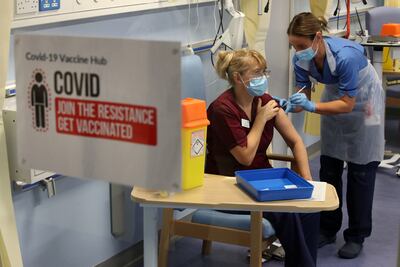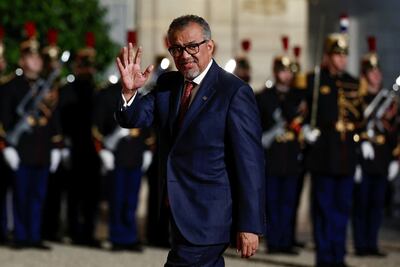Preparations for tackling the next pandemic are missing their "biggest piece of the puzzle" owing to delays in agreeing to a new treaty on sharing vaccines and medicine, the head of the World Health Organisation said on Monday.
Dr Tedros Adhanom Ghebreyesus said "crucial issues" remained unresolved months after 194 countries were supposed to agree on a pandemic treaty. He spoke in Berlin as a new risk report was presented, warning there was "every likelihood" of the world being "caught napping" by a disease outbreak, as it was with Covid-19.
Outbreaks of illnesses such as Middle East respiratory syndrome, H5N1 bird flu and the Marburg virus "remind us that the next pandemic is not a question of if, but when", Dr Tedros said in remarks to the World Health Summit.
Negotiators will resume talks on the pandemic treaty next month after missing a May deadline. The target date for the agreement and been revised to 2025. Divisions opened over how far rich countries should be required to share medicine and technology with the Global South, after some rich nations were accused of hoarding Covid-19 vaccine doses.
One treaty proposal that has caused contention would give the WHO access to up to 20 per cent of the vaccine stock, while countries would also commit to a “more equitable” sharing of medicine. The suggestion raised concerns about countries ceding sovereignty to the WHO.
"The biggest remaining piece of the puzzle is the WHO pandemic agreement. Although member states have made progress, some of the most crucial issues have not yet been resolved, but I am confident they will be," Dr Tedros said.

The WHO has said it does not want to dictate national policies and dismissed the suggestion it could order lockdowns or vaccination campaigns as conspiracy theories. The report, by the Global Preparedness Monitoring Board, said mistrust could hinder any response to a pandemic in the future.
Questions of social trust "have not yet received the sustained policy and scientific attention they deserve", it said. "Lack of trust can drive both the emergence of novel viruses and the amplification of outbreaks, by undermining compliance with control measures and incentivising secrecy rather than transparency."
Countries did agree in May to allow the WHO to declare a "pandemic emergency" as a new highest alert level, but its provisions are not binding. There have also been initiatives on disease monitoring and the development of mRNA vaccines.
"Despite these improvements, made in the wake of the Covid-19 pandemic, there is every likelihood that the next pandemic will again catch the world napping, without the readiness plans primed for implementation from day one," the report said.

Kolinda Grabar-Kitarovic, a former president of Croatia and chairwoman of the Global Preparedness Monitoring Board, told the Berlin summit that the world was "once again entering the phase of neglect in the typical panic-and-neglect cycle".
Although the Covid-19 pandemic was often described as a once-in-a-century health crisis, that "does not mean we can let our guard down for the next 100 years", Ms Grabar-Kitarovic said. "The Covid-19 pandemic has left a deep, lasting impact on societies, much like post-traumatic stress disorder," she added. "The prolonged exposure to uncertainty, loss and trauma has affected mental health and continues to influence behaviours and responses long after the immediate crisis has passed.
"People, governments and organisations are eager to move on from the pandemic. However, this rush to return to normalcy risks leading to complacency – exactly at a time when vigilance is needed most."


